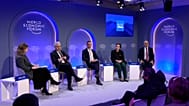Young people are rallying against fast fashion. To meet the demand, designers are turning to social media.
Fast fashion is a spiralling problem for European consumers. In 2019, the UN reported that the fashion industry is responsible for 8-10 per cent of global carbon emissions.
Not only does the production of textiles require a lot of water and produce a lot of CO2, but many of these products end up going to landfill or being incinerated, instead of actually being worn.
Wasted clothing is where the damage of fast fashion is felt the most. In Europe, UK consumers buy the most items out of all other European markets, with each person purchasing an estimated 26.7kg of clothing every year.
This is far more than the average person will use often, so the lifespan of pieces of clothing is very short. To make it even worse, cheaper fabrics used in high-street fashion contain plastics, such as polyester. These materials can’t be recycled and form the bulk of waste material piling up in landfills.
Thankfully, there is finally more attention being given to the environmental impact of fast fashion.
With that, more and more consumers are looking for eco-friendly alternatives - and many are turning to TikTok for tips.
The rise of ethical fashion
To meet the demand, fashion business owners have had to start using their imaginations.
One TikTok designer is Scarlett Hawkes of AFRAYED Upcycling. Conscious of the impact of fast fashion from a young age, Scarlett had always enjoyed sewing clothes for herself.
When fabric became harder to buy online in March 2020 due to COVID-19, Scarlett began using old clothes around the house to experiment with. Her day job in a charity gives her access to rags and scraps that would otherwise go to landfill, so Scarlett jumped at the opportunity to put them to good use.
Today, Scarlett has turned her hobby into a small business that sells bespoke patchwork clothing to people around the world, using fabric that would otherwise go to waste to create whole new pieces.
Over the last year, Scarlett has seen an increase in international sales, particularly hailing from the US. She puts the soaring popularity of her designs down to rising demand for environmentally-conscious fashion.
“All my customers say that the main reason [they buy from me] is because it's taking old clothes and making it into something new,” Scarlett notes. “The environment is the main value [for them] across the board.”
She continues, “I think COVID-19 has possibly even helped, because people are sitting there reading about the unpaid garment workers. They're hearing more about these fast fashion companies and what they're doing.”
Waste not, want not
What makes Scarlett stand out from any other zero-waste designers is her creative attitude towards waste reduction. Not only does she use up fabric scraps to create items in the first place, Scarlett also gathers up and sorts the waste fabric left over from her own creations to make sure there is nothing leftover.
Sorting them by size, Scarlett puts the scraps to work. Some larger pieces can be made into headbands, ready to sell on her website. For smaller scraps, Scarlett buys old fleece blankets on eBay that would likely also end up going to landfill otherwise.
She stuffs them with the tiny scraps left over from her work and can give them a new lease of life as dog and cat beds, which she donates to local shelters.
Scarlett shares timelapse videos of herself sorting the fabrics on TikTok, offering people insights into the inner workings of her business. With TikTok’s algorithm known for spreading content easily and quickly, ethical and sustainable fashion has never been easier to find. Popular videos can go viral at the drop of a hat.
With more and more people seeing the amount of potential textile waste she saves, the videos are simultaneously informative and oddly satisfying to watch.
The importance of circularity
Scarlett’s innovative methods show how sustainability needs collaboration to truly succeed.
On its own, the fashion industry can’t make sure all waste goes to use. However, just as Scarlett's business thrives by dipping into different industries and using leftovers to create pet supplies, greater collaboration could mean less waste overall.
Indeed, John Pabon, Founder & Chief Advisor of Fulcrum Strategic Advisors, a risk management firm with a focus on sustainability, has noticed this trend towards circularity becoming more prevalent, even in larger companies.
Not only are physical resources being shared, but also the intellectual kind.
“When companies come together around a table,” John explains, “they often find there are questions others within the group can answer or other learnings that can fast-track progress on sustainability. Most of what companies face is actually industry-agnostic.”
Sustainability as a whole is certainly an industry-agnostic issue. Every sector plays its part in contributing to the climate crisis and will be equally hit by the repercussions - unless substantial changes are made. If we’re truly going to tackle bigger problems like fast fashion and over-consumption, green efforts need to grow larger than just one business or even one industry.
Becoming truly zero-waste is a process that even Scarlett herself hasn’t managed completely. Nonetheless, she’s determined to continue making her business as zero-waste as possible, as well as ensuring prices are more accessible to a wider range of people.
“Even though zero-waste has been around for a while, it’s still a new concept to a lot of people,” Scarlett says. “You’ve just got to be creative and don't be too hard on yourself if it isn't completely zero-waste at the very start. It takes time.”



















